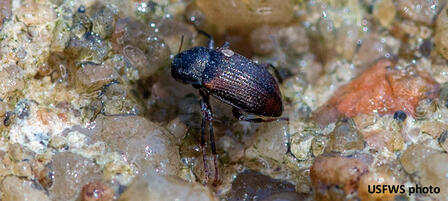Rare Species Not Listed as Federally Endangered Due To KDWPT Efforts

PRATT – After a comprehensive review, the U.S. Fish and Wildlife Service (USFWS) announced last week that it would not list the Scott riffle beetle, Optioservus phaeus, under the federal Endangered Species Act (ESA). The Scott riffle beetle is a tiny brown and black aquatic insect that was first identified as a distinct species in 1978. Big Spring, a groundwater spring complex in Historic Lake Scott State Park near Scott City, is the only place in the world the insect is known to exist.
An Oct. 4, 2019 USFWS news release reported that due to ongoing conservation actions and protections by the Kansas Department of Wildlife, Parks, and Tourism (KDWPT), federal protections for the beetle under the ESA were not warranted.
Staff from KDWPT’s Ecological Services Section and Parks Division have been working together to implement conservation actions for the Scott riffle beetle since 2016.
The USFWS also expressed confidence in KDWPT’s ability to continue managing for the beetle in the wild, based on the best available science. The USFWS will continue providing conservation support and guidance, as needed.
Critical to this species is the unique spring habitat where it resides – an area KDWPT continually works to maintain and protect. Based on data collected in 1984 and 2017, management efforts are working, as the population has remained stable for more than 30 years. Additional conservation efforts for the species include population monitoring, deployment of a real-time water quality and quantity monitoring station, and predatory fish removal.
The Scott riffle beetle is currently listed as Endangered under the Kansas Non-game and Endangered Species Conservation Act and lives solely within Historic Lake Scott State Park, providing the species with a level of protection uncommon in other areas. The local geology of the spring and the High Plains aquifer also suggest the unique spring habitat is unlikely to go dry in the foreseeable future.
"Big Spring is an uncommon habitat in an otherwise dry western Kansas,” said KDWPT aquatic ecologist Jordan Hofmeier. “The fact that the Scott riffle beetle has persisted here speaks to the resiliency of the species and the habitat, and the excellent management of the area by the park staff."
To learn more about the Scott riffle beetle, visit ksoutdoors.com/Services/Threatened-and-Endangered-Wildlife/All-Threatened-and-Endangered-Species/SCOTT-OPTIOSERVUS-RIFFLE-BEETLE.
To view the official USFWS news release, visit https://www.fws.gov/mountain-prairie/pressrel/2019/10042019-Endangered-Species-Act-Protection-Not-Needed-for-Rare-Insect.php.
-30-







